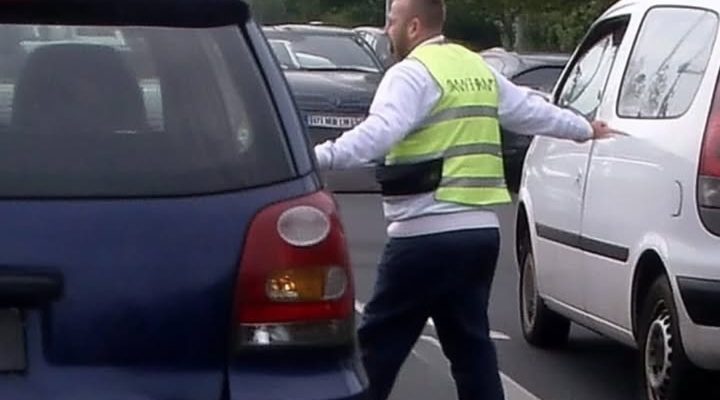Taylor had always mistrusted doctors. A traumatic event from his childhood had planted a deep seed of resentment, and over the years, that distrust shaped his life in ways he hadn’t anticipated. It even made him ignore an ambulance in a traffic jam one fateful morning—a decision that nearly cost him everything.
Taylor’s wife, Polly, had been asking for help. With three children, her job as a writer, and the demands of running their home, she was overwhelmed. “We need a nanny,” she pleaded one evening after dinner.
Taylor shook his head firmly. “A nanny? They’re too expensive, and it’s not worth it,” he dismissed. “Your job isn’t even real,” he thought, though he would never dare say it aloud.
Polly sighed, defeated. She knew Taylor wouldn’t budge. His upbringing—raised mostly by a single mother after his father abandoned the family—made him believe in self-reliance above all else. “I turned out fine without help,” he often said. Polly gave up asking, knowing her pleas would fall on deaf ears.
One afternoon, Polly fainted in the living room. Their eldest son, Mark, panicked and called Taylor at work. “Should I call 911?” the boy asked.
“No, absolutely not!” Taylor barked. “Call Mara, the neighbor. She’s a nurse. I’ll be there soon.”
When Taylor arrived home, Polly was awake, but Mara was adamant. “She needs to see a doctor,” Mara said. Taylor refused, revealing the painful reason behind his distrust. His mother’s cancer had been misdiagnosed, and by the time it was discovered, it was too late. “Doctors failed her,” he muttered. Mara reluctantly agreed to check Polly’s bloodwork herself.
The tests revealed mild anemia, and Polly recovered with medication. Still, she broached the subject of hiring a nanny again. Taylor’s response was the same: a firm “No.” His refusal wasn’t just about money—it was about control, about proving he could handle everything on his own.
Months later, Taylor was rushing to a meeting when a massive traffic jam brought his car to a standstill. As he fumed, sirens blared behind him. An ambulance was trying to get through, but Taylor refused to move, convinced it was just a ruse to bypass traffic. Other drivers yelled at him to make way, but he stayed put, defiantly gripping the wheel.
The ambulance driver, an older man, got out and pleaded with Taylor. “There’s a child in critical condition back there! Please, move!”
Taylor stared straight ahead. “No. Doctors don’t help. I’m not moving,” he said coldly.
The driver, frustrated and desperate, maneuvered the ambulance onto the sidewalk, finally making it through the jam. Taylor barely gave it another thought, relieved when traffic finally began to clear.
Later that day, as Taylor sat in a meeting, his phone buzzed repeatedly. He ignored it until a message from Polly popped up: “Mark is in the hospital! Call me ASAP!”
Panic surged through him. Taylor rushed to the hospital, where Polly explained that Mark had suffered a severe head injury after a fall. “The ambulance barely got us here in time,” she said, tears streaming down her face. “There was some idiot blocking the way. Can you believe that?”
Taylor’s heart sank. The realization hit him like a punch—he had been that idiot.
Hours passed before the surgeon emerged. “Your son is stable,” the doctor announced. “It’s a good thing the ambulance got him here quickly. A delay could have been fatal.”
Taylor nodded, his throat tight. He couldn’t bring himself to speak. Guilt consumed him as Polly comforted their younger children. He had almost cost his son’s life because of his stubbornness.
Determined to make amends, Taylor sought out the ambulance driver. “You again,” the driver said, recognizing him immediately. “You’re the guy who wouldn’t move.”
Taylor bowed his head. “I’m sorry. You saved my son. Thank you for not giving up.”
The driver, James, softened at Taylor’s sincerity. They talked, and Taylor learned that James was still working to pay for his wife’s hip surgery. An idea formed in Taylor’s mind. “Would you consider working for me as my driver?” he offered. The salary was more than triple what James earned driving ambulances.
James agreed, and over time, he became more than just a driver. He ran errands, helped with the kids, and became a trusted part of the family. When his wife recovered from her surgery, Taylor hired her as the family’s nanny. Polly finally had the support she needed, and the children adored James and his wife, Helena.
Taylor’s transformation didn’t stop there. He became a benefactor for the local hospital, funding programs to help children from low-income families receive care. His distrust of doctors faded, replaced by deep gratitude for the team that had saved Mark. Every time he saw an ambulance on the road, he was the first to pull over, his heart heavy with the memory of his near-fatal mistake.
Through it all, Taylor learned a powerful lesson: life’s most valuable currency isn’t money—it’s time, love, and the people we choose to help along the way.




Your article helped me a lot, is there any more related content? Thanks!
1vin pro [url=http://1win6048.ru]http://1win6048.ru[/url] .
Купить диплом ВУЗа по выгодной стоимости возможно, обращаясь к надежной специализированной фирме. Мы оказываем услуги по продаже документов об окончании любых университетов РФ. Заказать диплом любого ВУЗа– [url=http://diplomnie.com/kupit-ofitsialnij-diplom-s-zaneseniem-v-reestr-bistro-4/]diplomnie.com/kupit-ofitsialnij-diplom-s-zaneseniem-v-reestr-bistro-4/[/url]
¡Saludos, usuarios de sitios de apuestas !
Juegos de casino dinero real te permiten ganar desde el primer momento.
Juegos de casinos online con ofertas exclusivas y jackpots grandes – https://www.youtube.com/watch?v=CRuk1wy6nA0&list=PLX0Xt4gdc3aJG7y03Wh5Qf0JrapCEgMFH
Con juegos de casino online chile puedes acceder a tragaperras, ruleta, blackjack y mucho mГЎs sin salir de casa. Las plataformas modernas ofrecen interfaces intuitivas y soporte tГ©cnico en espaГ±ol. AdemГЎs, puedes jugar tanto en tu ordenador como en dispositivos mГіviles.
¡Que disfrutes de grandes logros !
I don’t think the title of your article matches the content lol. Just kidding, mainly because I had some doubts after reading the article.